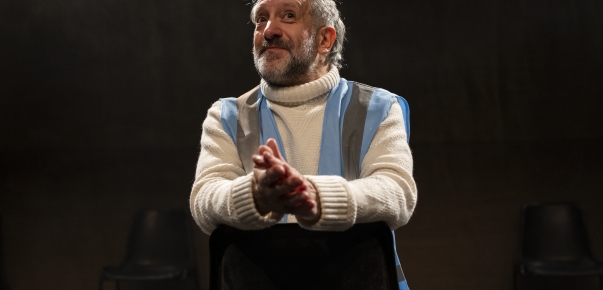How we approached the themes of Choir Boy
4 Oct 2023I’ve had the pleasure of holding the Choir Boy rehearsal room with a lot of laughter, joy and lavender mist. The themes and events of this play hit home for our team as I’m sure they will for our audiences, but we never finish a rehearsal without the chance to crack a few jokes, dance, and decompress however the company needs on a given day.
Nancy Medina, Director of Choir Boy and Artistic Director of Bristol Old Vic

In the rehearsal room, the Choir Boy company explored the layers of Tarell Alvin McCraney’s play with a great deal of detail. The company takes part in inquisitive, compassionate questioning, which is paired with research: there’s an ever-growing communal library full of books, articles, images and other references which the cast and creative team have brought in to share in relation to our explorations.
Protecting the Company
As we explore the themes of the play deeply, and each actor imagines the truth at the centre of the character they are building, we understand that there will be moments in the rehearsal process that can activate personal emotions and memories for cast and company members.
To support us through this process, we have a Drama Therapist named Samantha Adams working alongside us. She works with us as a group and on a 1-2-1 basis, supporting our company to encounter the kinds of intense feelings that the play may expose in a healthy and sustainable manner. Samantha often reminds us, “theatre is medicine”, and we keep that sentiment in our minds and bodies as we navigate and expose challenging themes.
We have an Intimacy Co-Ordinator named Ingrid Mackinnon who works with the actors in scenes that contain moments of physical intimacy. She acts as a liaison between each actor and the director to discuss what each actor feels comfortable performing onstage and ensure the scenes are created on a consent-informed basis.
Our Fight Director Kev McCurdy is also present in the process, working with the actors to simulate physical combat in a realistic and safe way.
The Use of Racial and Homophobic Slurs
There are several instances in Choir Boy where characters use racial and homophobic slurs to authentically represent the very real challenges, abusive power structures and aggression that Black and Global Majority people and LGBTQ+ people continue to face
in our society. In order to establish clear boundaries around when and why these words are used in the rehearsal room, we discussed the etymology, history and cultural significance of both the N-word and F-word on the first day of rehearsal. Our conversation was, and continues to be, held with care and compassion. We found it useful to be nuanced about each word, breaking down the history of them and the current linguistic uses in both the USA and the UK. These words were only ever said by actors when required in the script, and were never used by members of the creative team.
THEMES
Race in Education
The school environment is pressurised for all young people. For young Black people, this pressure is heightened for a variety of reasons. Growing up we are often taught that it is not enough for Black children to meet expectations — we must exceed them to be seen as valuable or worthy of opportunities. As a company we explored the pressures for young people to live up to these notions of Black excellence in relation to the underlying tones of white supremacy, allyship, and saviourism in the text.
Masculinity and Femininity
We discussed (and continue to discuss) the constructs of masculinity and femininity as they emerge in the text. We asked ourselves what behaviours could be labelled toxic masculinity and what could be labelled as effeminate. We thought about how society’s attitudes can be projected on others, narrowly defining queerness and/or blackness.
Spirituality
Spirituality is at the heart of Choir Boy, but it is held differently by each character. We discussed how one carries spirituality from previous generations, and how we personally engage in spirituality and how society does or doesn’t. We also spent time considering the history of Christianity and spirituality in the African American context in order to paint an accurate picture of the role religion and spirituality may play in each character’s life.
Choir Boy also touches on:
- Grief of a child for their parent
- We see physical violence made by a teacher against a student
- Physical violence between students is discussed
- We partially see a moment of physical intimacy between two students
- There are passages of text which specifically deal with the transatlantic enslavement, the lives of people who were enslaved, and their descendants.
Tatenda Shamiso
Associate Director


